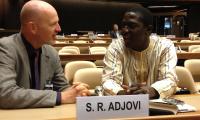United Nations to strengthen right to court review of detention

All state authorities, including police or security forces must have valid reason for detaining people. Hence, it is a human right to challenge detentions in court. But the way in which this right is protected varies substantially from country to country.
Therefore, the Human Rights Council has asked the UN Working Group on Arbitrary Detention to draft guidelines and principles to aid countries in making this right a reality.
On 1-2 September 2014 the Working Group invited civil society, states, national human rights institutions and others to meet in Geneva to provide input to the work on new guidelines and principles.
African pioneering work
One of the sources of inspiration are the Luanda Guidelines on Conditions of Arrest, Police Custody and Pre-Trial Detention in Africa – adopted by the African Human Rights Commission in May 2014.
- The Luanda Guidelines set out in practical terms many of the safeguards necessary to make the right to challenge detention meaningful and possible, says Ulrik Spliid who represented the Danish Institute in Geneva.
The Luanda Guidelines were conceived by, among others, the African Policing and Civilian Oversight Forum, a partner of the Danish Institute for Human Rights in its partnership with the African Commission on Human and Peoples’ Rights. The Danish Institute also contributed to the Luanda Guidelines.
-During the plenary discussions and in informal discussions with the members of the Working Group, including the Working Group’s African member, Roland Adjovi, we witnessed great interest for the Luanda Guidelines. It will be very encouraging for the people working on human rights in Africa to see that their efforts is given its due recognition also in the standard setting at the UN level, Ulrik Spliid explains.
Collaboration between the UN and the African human rights system
Collaboration between the global human rights system, as represented by the United Nations, the regional human rights system, such as the African Commission, and the national human rights system has become more and more in focus. This is an acknowledgement that all levels are necessary to make human rights a reality for all the citizens of the world.
The Danish Institute also encouraged the Working Group to take into account Denmark’s experiences with administrative detention of asylum seekers, in particular the need to subject asylum seekers to a thorough medical and psychological assessment prior to detention.
In fact, it has been a mainstay of human rights since 1215, when it was first set out as the habeas corpus right in the Magna Carta Libertatum, the charter limiting the powers of then King John of England.
Globally, the right is protected by the Universal Declaration of Human Rights and in Denmark by the Constitution and various legislation.
The draft guidelines and principles on the right to challenge detention are expected to be presented to the UN Human Rights Council before the end of 2015.
The principles and guidelines should take into account what is actually achievable on the ground.
Similarly, the principles and guidelines should consider the practical obstacles, not only the legal obstacles, to making the right to challenge detention a reality.
Thorough medical and psychological assessment should be compulsory prior to detention of asylum seekers.
